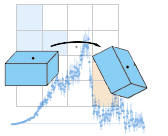
| HOME | PEOPLE | RESEARCH | ACADEMICS | TRAVEL/VISITORS | LINKS | CONTACT |

|
Web Mail
Mailing Lists
Computing Resources
Site Map
Model Validation, Computation, and Control
Matthew P. Newlin, Mechanical Engineering, California Institute of Technology
Friday, September 22, 19953:00 PM to 4:00 PM
Thomas 206
Engineering is fundamentally concerned with controlling and predicting future behavior with some certainty despite having imperfect information. Although feedback can be exceptionally effective and is often easy to apply, the behavior of a system under feedback can be extremely sensitive to the ever present model mismatch. Robust control theory addresses this difficulty by parametrizing a family of feedback controllers that are less sensitive to model mismatch. In particular, the $\mu$ framework requires performance for a set of models, and is the basis for robust control computation.
Initial work in robust control focused on analysis for sets parametrized by complex uncertainty in the frequency domain and on the consequent computation. Such model sets are unrealistic: uncertainty in mass, stiffness, aero-coefficients, and the like are naturally modeled as real variations. This presentation includes initial work on practical upper bound computation and substantially improved lower bound computation for moderately large robust control analysis problems that include such real parametric uncertainty, despite the computational complexity of the problem. Further, branch and bound is shown to be a limited but critical tool for better computation, a fact which has gone previously unrecognized.
Together, these contributions allow for the practical computation of robust control problems of engineering interest and provide the basis not only for applications that may ultimately determine the utility of the robust control paradigm, but also for the computation of various outgrowths of the $\mu$ framework. One such outgrowth is the model validation problem, which tests whether a robust control model in the $\mu$ framework is consistent with experimentally determined time histories. The practical computation of the model validation problem, which follows naturally from the work presented here, will provide an explicit connection between robust control theory and practical applications. Future work along these lines should elevate the application of robust control theory from chance and intuition to a standard engineering tool.
|
©2003-2011 California Institute of Technology. All Rights Reserved webmaster |
|